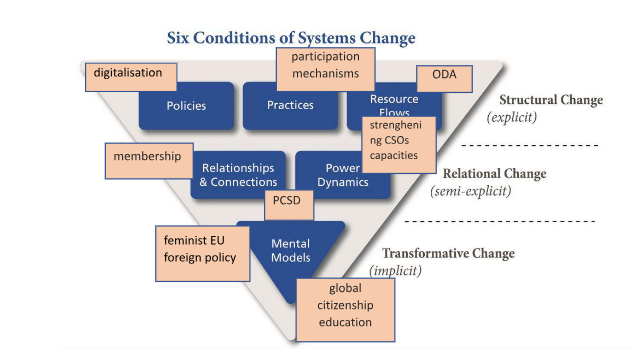
By Rilli Lappalainen
President of CONCORD
The thoughts and views contained in this blog do not represent a CONCORD position.
Dear colleagues,
First of all, I would like to thank you for the trust to elect me as your president for the coming years. I am honoured, and humbled, and very much looking forward to continuing the great collaboration we have had until now.
We have a bumpy road ahead. Geopolitical, financial and environmental turbulences one after another are ahead. But I am still confident that using our intelligence, knowledge and strategic cooperation we can make wise choices about where to put our efforts to maximise the impact we are looking for.
CONCORD strategy is based on systemic thinking. We have, for many years, been working to transform the imbalanced and unjust political and economic systems and power structures. In recent years, we have refocused our efforts on reducing inequalities between people and between countries, looking at the multiple root causes of those inequalities. And we have, both at national and EU levels, re-emphasised the importance of a vibrant civil society for resilient and healthy societies, which promote the well-being of all people within the limits of our planet.
As the EU has transitioned from ‘development cooperation’ to ‘international cooperation’ to ‘promoting fair and equal partnerships’, we have stepped up our engagement with the EU on the nature of meaningful partnerships. We will intensify our demands for system change and greater equality for all people to contribute to just and inclusive societies. We will balance responding to shorter-term urgencies with reflecting on longer-term trends and their impacts on people and the planet.
We will praise open civil society space and refuse to be side-lined; we will increase our visibility and our profile. To this end, we will continue to fight for adequate funding both for our core issues and for our sector. We will strengthen our power and voice and will reach out to people across Europe to raise awareness of the critical issues of our time and to promote a culture of solidarity, global citizenship, and sustainable lifestyles.
While focusing on influencing the EU, we will also continue to evolve as a sector; we will reflect on and be propositional on how international cooperation and all actors can best contribute to sustainable development around the world. And we will work more closely with colleagues in other parts of the world to reinforce their calls for change, based on local proposals.
After reading again the great work done during the year, I am very proud of the guidance of our strategy to move more towards looking for systemic change. Like grand old American systems scientist Peter Senge together with John Kania and Mark Kramer, have said: Organisations involved in systems change can increase their odds for success by focusing on less explicit but more powerful conditions for change, while also turning the lens on themselves. They called it The Water of Systems Change.
There are six conditions and three levels in the water of systems change. CSOs have long worked at the first level of the triangle to inform government policy, promote more effective practices, and direct human and financial resources toward their chosen goals. Changing these structural conditions can have powerful effects. The results are readily observable and can often be assessed through traditional evaluation and measurement techniques. But without working on the other two levels, shifts in system conditions are unlikely to be sustained.

The same interdependencies operate at the second level. Shifting power dynamics and building relationships across sectors and political divides may feel especially threatening to CSOs but it is essential work in systems change. Transforming a system is really about transforming the relationships between people who make up the system. For example, far too often, organisations and individuals working on the exact same problems do so in isolation from each other. Simply bringing people into a relationship can create a huge impact.
When it comes to seeing and talking about the water of systems change, the third level – mental models – poses the greatest challenge and, for many CSOs, is the newest dimension of the work. Mental models are foundational drivers of activity in any system. Unless people can learn to work at this third level, changes in the other two levels will, at best, be temporary or incomplete.
The priority topics we have selected to work on also often take a long time to be achieved. That’s why at the same time we need to continue the work to make change happen through engaging, challenging, evolving and innovating like we selected in our strategy and checking with the conditions of system change where we are.
I reflected in the picture above some of our priority areas and how we mostly tackle the topics. This is not at all the whole truth but try to visualise where the work so far has mostly been seen. I hope it inspire you to think it deeper and challenge me and others for the further discussions how to improve our collective thinking.
